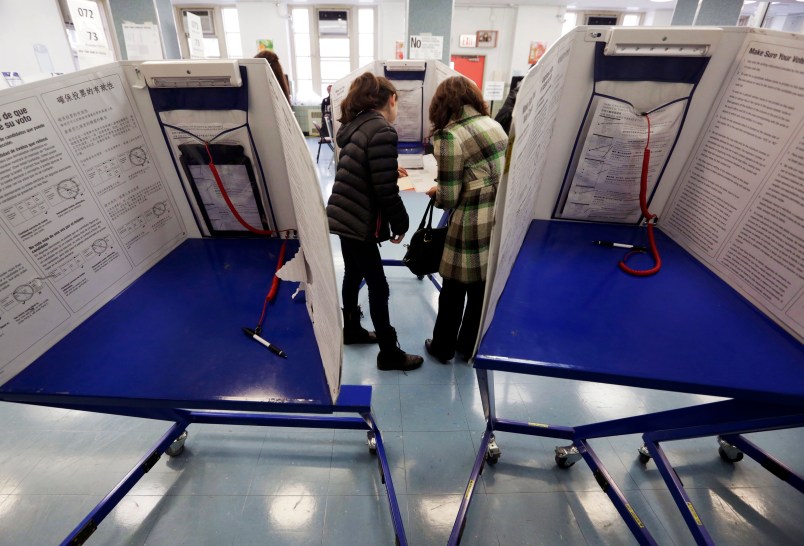The debate over voting rights has gone to college.
Two University of Massachusetts Boston academics — Keith G. Bentele, an assistant professor of Sociology, and Erin O’Brien, an associate professor of Political Science — recently published a paper looking at the proposal and passage of restrictive voter access legislation from 2006 to 2011. In the paper, titled “Jim Crow 2.0? Why States Consider and Adopt Restrictive Voter Access Policies,” the authors conclude that restrictive voter measures are connected to both partisan and racial factors.
“We looked at proposed and passage over this period, and we looked at just 2011 specifically,” Bentele told TPM in an interview this week. “And you have this consistent emergence — over and over and over — these partisan and racial factors are the most strongly associated with these outcomes.”
The paper focused on a range of restrictive voter access legislation. That means not just voter ID bills, but also the regulation of groups who register voters, the shortening of early voting periods, and other issues. And these efforts were not limited geographically. Restrictive voter access legislation was proposed in nearly every state in the country during the six-year period looked at, and at least one restrictive change passed in half the states.
According to Bentele, the most striking findings came when analyzing only the proposed restrictive access legislation. There were a “handful” of factors associated with the proposal of more bills in recent years, Bentele said, and “they’re basically all racial.” States that saw higher minority turnout in the previous presidential election, and states that had more African American and non-citizen residents, saw more bills proposed.
What about the great Republican specter of voter fraud?
“If you want to be extraordinarily generous, you could say allegations of voter fraud may have been a very, very small contributing factor,” Bentele said, speaking more generally about voter restriction efforts. “But in general, these partisan and racial effects seem to be really, really strongly associated with this outcome.”
In the paper, the researchers placed the recent restriction efforts in context, as part of a history of measures “trumpeted as protecting electoral legitimacy while intended to exclude the marginalized for a particular political party’s advantage.” They argue that the Republican Party has engaged in “strategic demobilization efforts in response to changing demographics, shifting electoral fortunes, and an internal rightward ideological drift among the party faithful.”
“I think that this [paper]… sidesteps the specific question of individual people’s motives and it looks at the broader context,” Bentele said. “Where are state legislatures doing this thing? Where is this broader activity happening? And again it’s happening disproportionately where it would be strategic for partisan reasons.”
Read the whole paper here.






